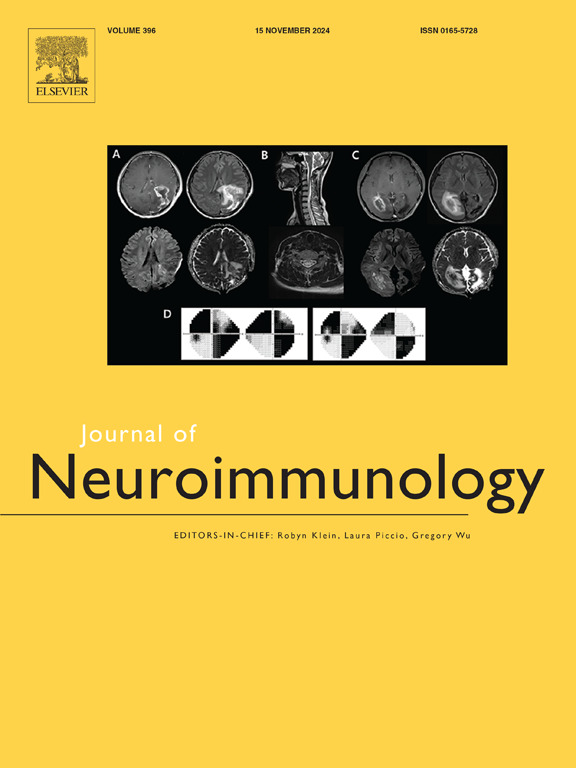Pediatric anti-CaVα2δ autoimmune encephalitis: A case report and literature review
IF 2.9
4区 医学
Q3 IMMUNOLOGY
引用次数: 0
Abstract
Anti-voltage-gated calcium channel alpha-2/delta subunit (anti-CaVα2δ) encephalitis is a rare autoimmune encephalitis (AE), with only two cases of anti-CaVα2δ AE have been reported in the literatureto date. The clinical characteristics and prognosis of this rare AE need to beexpanded.We present the case of a 9-year-oldgirl, who initially presented with fever and lymphadenitis, which progressed to headaches, drowsiness, frequent seizures, cognitive impairment, memory loss, and involuntary movements. Brain magnetic resonance imaging revealed lesions in the bilateral external capsule. Moreover, anti-CaVα2δ antibodies were detected (1,30) 3 and 5 weeks after symptom onset. Video electroencephalography revealed slow, severely diffuse, background activity with multifocal epileptiform discharges. Although the patient was administered a combined immunotherapy consisting of intravenous immunoglobulin, intravenous methylprednisolone, and rituximab, sheexhibited persistent neurological sequelae at the last follow-up (Modified Rankin Scale score of 4; Pediatric Quality of Life Inventory score of 75). Whileour case shares similar clinical characteristics with previously reported anti-CaVα2δ AE cases, our patientwas unresponsive to immunotherapy and experienced severe neurological sequelae during follow-up. This report broadens the clinical phenotype and prognosis associated with this rare condition, providing further information and clinical insights for the management of future cases.
小儿抗cav α2δ自身免疫性脑炎1例报告并文献复习
抗电压门控钙通道α -2/ δ亚基(抗cav α2δ)脑炎是一种罕见的自身免疫性脑炎(AE),迄今文献中仅报道2例抗cav α2δ AE。这种罕见AE的临床特征和预后需要进一步研究。我们报告一名9岁女孩的病例,她最初表现为发烧和淋巴结炎,后来发展为头痛、嗜睡、频繁癫痫发作、认知障碍、记忆丧失和不自主运动。脑磁共振成像显示双侧外囊病变。此外,在症状出现后3周和5周检测抗cav α2δ抗体(1,30)。视频脑电图显示缓慢、严重弥漫性背景活动伴多灶性癫痫样放电。尽管患者接受了由静脉注射免疫球蛋白、静脉注射甲基强的松龙和利妥昔单抗组成的联合免疫治疗,但在最后一次随访中,她表现出持续的神经系统后遗症(修正兰金量表评分为4分;儿童生活质量量表得分为75)。虽然我们的病例与先前报道的抗cav α2δ AE病例具有相似的临床特征,但我们的患者对免疫治疗无反应,并且在随访期间出现了严重的神经系统后遗症。该报告拓宽了与这种罕见疾病相关的临床表型和预后,为未来病例的管理提供了进一步的信息和临床见解。
本文章由计算机程序翻译,如有差异,请以英文原文为准。
求助全文
约1分钟内获得全文
求助全文
来源期刊

Journal of neuroimmunology
医学-免疫学
CiteScore
6.10
自引率
3.00%
发文量
154
审稿时长
37 days
期刊介绍:
The Journal of Neuroimmunology affords a forum for the publication of works applying immunologic methodology to the furtherance of the neurological sciences. Studies on all branches of the neurosciences, particularly fundamental and applied neurobiology, neurology, neuropathology, neurochemistry, neurovirology, neuroendocrinology, neuromuscular research, neuropharmacology and psychology, which involve either immunologic methodology (e.g. immunocytochemistry) or fundamental immunology (e.g. antibody and lymphocyte assays), are considered for publication.
 求助内容:
求助内容: 应助结果提醒方式:
应助结果提醒方式:


